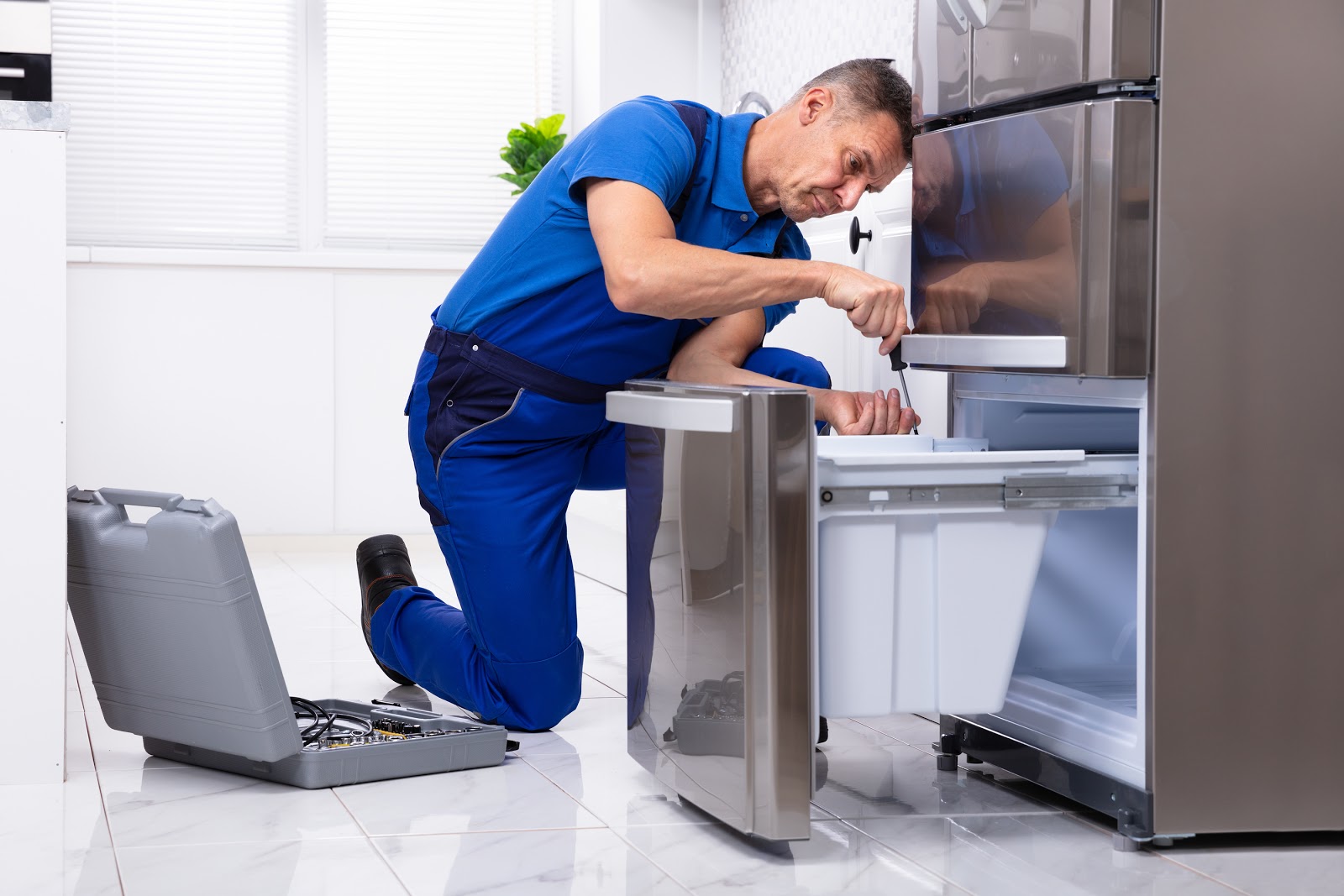Why Washing Machine Repair Dependable Refrigeration & Appliance Repair Service is the Smart Homeowner’s Choice
Why Washing Machine Repair Dependable Refrigeration & Appliance Repair Service is the Smart Homeowner’s Choice
Blog Article
Important Tips for Effective Ref Fixing to Extend Appliance Life Expectancy
When it comes to your refrigerator, proper fixing and upkeep are vital for long life. Comprehending usual troubles and understanding when to act can make all the distinction.
Understanding Usual Fridge Troubles
Fridges are vital in maintaining your food fresh, yet they can experience a series of typical issues that interrupt their efficiency. One constant concern is poor air conditioning. If you observe food spoiling quicker than typical, examine the thermostat settings or consider if the door seals are harmed. Another typical problem is excessive noise, which could indicate a malfunctioning compressor or a stopping working fan. You could also experience water merging inside or underneath the refrigerator; this usually results from a blocked defrost drain or a defective water line. Furthermore, if your fridge's light isn't functioning, maybe a basic light bulb concern or a trouble with the door button. Ice accumulation in the fridge freezer can impede air movement and cooling down effectiveness. Acknowledging these issues early can conserve you money and time out of commission, guaranteeing your refrigerator runs smoothly and efficiently.
Normal Upkeep Practices
To maintain your appliances running efficiently, you require to remain on top of regular maintenance methods. Tidy the condenser coils, inspect the door seals, and keep track of the temperature setups to ensure peak performance. These simple tasks can save you time and money on repairs down the line.
Tidy Condenser Coils Frequently
Cleaning your condenser coils consistently can significantly improve your device's efficiency. Dirt and dust develop up on these coils over time, triggering your appliance to work more challenging and consume more energy. To keep them clean, disconnect your device and thoroughly remove any protective covers.
Check Door Seals
Three basic actions can aid you assure your device's door seals are in great problem. Second, tidy the seals utilizing warm, soapy water to remove any kind of particles or grime. By adhering to these actions, you'll preserve your device's performance and longevity, conserving you money on energy bills and repairs in the lengthy run.
Screen Temperature Level Settings
Routinely checking your device's temperature level settings is important for best efficiency and performance. Whether you're taking care of a refrigerator, fridge freezer, or oven, keeping an eye on these settings can protect against lots of issues. For refrigerators, go for temperatures between 35 ° F and 38 ° F; for fridges freezer, stay 0 ° F. If the temperatures are expensive or reduced, your appliance might work harder, squandering power and shortening its life-span. Utilize a thermostat to check these settings regularly, specifically after significant modifications, like moving your appliance or adjusting the thermostat. If you observe changes, adjust the setups appropriately and speak with the individual handbook for support. By remaining aggressive about temperature monitoring, you'll guarantee your home appliances run smoothly and last longer.
Repairing Air Conditioning Concerns
When your fridge isn't cooling down properly, it can result in ruined food and threw away money, so addressing the issue immediately is crucial. Start by inspecting the temperature setups to verify they're at the suggested degrees, usually around 37 ° F for the fridge and 0 ° F for the freezer. If the settings are correct, check the door seals for any spaces or damages; a faulty seal can allow cozy air to enter.
Next, analyze the vents inside the fridge and fridge freezer. Confirm they're not blocked by food products, as this can interrupt air movement. Listen for the compressor; if it's not running or making uncommon noises, it might need focus. Lastly, check the condenser coils, generally located at the back or bottom of the system. Dust and particles can gather, creating cooling down problems. Clean them with a vacuum cleaner or brush to maximize efficiency. If problems persist, it could be time to call a professional.
Taking Care Of Water Leakage and Ice Build-Up
If you're managing water leak or ice build-up in your appliance, it's important to determine the resource of the trouble. By identifying where the water is coming from, you can stop additional problems and avoid expensive repair work. Let's explore some reliable strategies to take on these usual issues.
Recognize Leakage Resources
How can you efficiently recognize the sources of water leak and ice accumulation in your appliances? Beginning by inspecting the seals and gaskets on your refrigerator and fridge freezer doors. By methodically inspecting these areas, you'll determine the resource of the trouble, permitting you to take the essential actions to repair it and prolong your appliance's lifespan.
Stop Ice Development
To stop ice formation in your home appliances, begin by validating the temperature settings are ideal. If your fridge or freezer is as well cold, it can bring about excessive ice build-up. Examine the door seals on this contact form a regular basis; damaged seals can allow warm air in, causing condensation and ice formation.
Maintain the appliance well-ventilated and prevent congestion, as this can obstruct air flow - Refrigerator repair experts Dependable Refrigeration & Appliance Repair. Routinely thaw your fridge freezer if it does not have an automated defrost feature.
If you observe water leak, recognize and fix any obstructed drainage holes, as they can contribute to ice build-up. Tidy the coils and validate they're working appropriately to maintain peak performance. Taking these actions will assist extend your appliance's life-span and efficiency.
Addressing Noisy Refrigerator Sounds
While it might appear worrying, a loud fridge typically indicates minor problems instead of major malfunctions. Initially, determine the resource of the sound. Common culprits consist of the compressor, fans, and water lines. If you hear a buzzing noise, it may be the compressor functioning hard; this might simply be a normal operation audio.
Following, look for loosened products inside. In some cases, containers or racks can rattle, developing undesirable sound. Tighten up or reposition them to get rid of the noises.
If you see a clicking sound, it might be the defrost timer. This is generally harmless yet might suggest it needs evaluation.
Ultimately, verify your fridge is level. An out of balance home appliance can produce resonances and sound. Use a level to inspect, and readjust the feet if needed. Dealing with these problems without delay can aid maintain your refrigerator's performance and prolong its life-span.
When to Replace Parts vs. Full Substitute

Nonetheless, if your device is older and experiencing multiple problems, a complete replacement could be much more affordable. Take into consideration the cost of repairs versus the appliance's value. If repair work surpass 50% of a new unit's cost, it's typically wiser to buy a replacement. Additionally, if you discover recurring troubles jenn air oven repair that maintain reoccuring, it's an indicator that your device has actually reached the end of its life. Evaluate these factors meticulously to make the finest choice for your requirements and spending plan.
Knowing When to Call a Professional
How can you tell when it's time to contact a specialist for home appliance fixing? If you notice unusual noises, smells, or leakages, it's a clear signal that something's wrong. Do not ignore these signs; they often show much deeper problems. If your appliance quits working entirely or regularly journeys breaker, it's another red flag.
You need to additionally consider your very own convenience level with fixings. If you're not sure about identifying the trouble or do not have the right devices, it's best to reach out for aid. Remember, attempting difficult repairs can bring about even more damages or perhaps security hazards.

Often Asked Concerns
How Usually Should I Clean the Refrigerator Coils?
You need to cleanse your fridge coils every 6 months. This aids preserve effectiveness and avoids overheating. If you observe extreme dust or pet hair, tidy them much more regularly to assure your refrigerator runs efficiently.

Can I Use Vinegar for Cleaning My Fridge?
Yes, you can use vinegar to cleanse your fridge! It's an exceptional natural cleanser that eliminates odors and spots. GE appliance repair Oro Valley Dependable Refrigeration & Appliance Repair Service. Simply blend it with water, apply it to surface areas, and wipe down for a fresh, tidy refrigerator
What Temperature level Should My Fridge Be Ready To?
You need to establish your refrigerator to 37 ° F(3 ° C) for excellent food preservation. This temperature level maintains your food fresh while preventing wasting, ensuring your grocery stores last longer and lowering waste. It's a very easy modification you can make!
Does a Fridge Need to Be Leveled?
Yes, your refrigerator needs to be leveled. If it's irregular, it can influence cooling effectiveness and cause excess sound. Check the progressing legs and change them to guarantee correct equilibrium for excellent performance.
Just How Can I Lower Fridge Energy Consumption?
To lower your refrigerator's energy intake, maintain it clean and well-ventilated, examine door seals for leakages, set the temperature between 35-38 ° F, and prevent overwhelming it. These steps can substantially lower your power bills.
Report this page